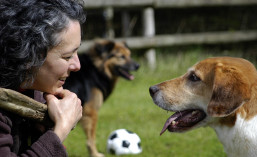Originally appeared in the St. Leo Parish (Tacoma, WA) weekly bulletin in 1999
In her best-selling book “A Return to Love,” Marianne Williamson points out the value of viewing our careers as opportunities to teach the message of salvation. In her view, every business is a “front” for a church and our role in any job is to minister to the children of God. No matter what we do, we can make it our ministry.
For the past 15 years, I’ve earned a living by training animals. How could this possibly be an opportunity to teach the message of salvation? Well, a few years ago, I began teaching dog obedience classes. You know — Spot sit, come and lie down. Not at all unusual, except that the training method I teach my students is considered unorthodox by many, and has been deemed downright revolutionary by countless other trainers.
This method, successfully used to train hundreds of species over the past five decades, is called clicker training. It uses reinforcements like food, petting and play to teach dogs to perform desired behaviors. The mistakes the dogs (and the humans) make during the learning process are expected rather than punished, and we strive to set up situations that let us “catch our dogs doing things right.” It’s fun for everyone and it works.
The thing is, it’s not yet a common way to train dogs. Most dogs are still routinely trained using compulsion: “do this or else.” The “or else” is often a sharp jerk on a metal chain around the dog’s neck. Avoidance of pain is a main motivator. With its emphasis on punishment and corrections, this traditional method may at times produce a well-behaved dog, but rarely a joyous one.
Our society is so willing to use coercion and threats to exact “appropriate” behavior. We spank our kids, berate our spouses, reprimand our employees and execute our criminals. We even subject ourselves to a litany of blame and self-criticism. This cynicism breaks down relationships, impeding Jesus’ mandate to love abundantly and forgive easily.
Most students who attend this training class haven’t really considered there might be a better way to interact with their fellow creatures. Those who experience the power of using positive methods with their dogs often report a kind of “runoff effect” on the rest of their lives. They start to re-examine the way they routinely treat family and friends. Some have even called this new way of relating an epiphany. And to think that the seeds of this new world-view were planted in the simplest of ways: by practicing innovative, non-violent communication in the completely innocuous setting of a dog training class.
A dog trainer in Phoenix described it this way: “I used to think teaching people to train their dogs wasn’t as important as more serious jobs that really affect people’s lives. Now that I teach students to train using operant conditioning and patience and understanding, and now that our society has gotten more impatient and violent, I think teaching people to use these methods is one way to help our world become a better place.”
